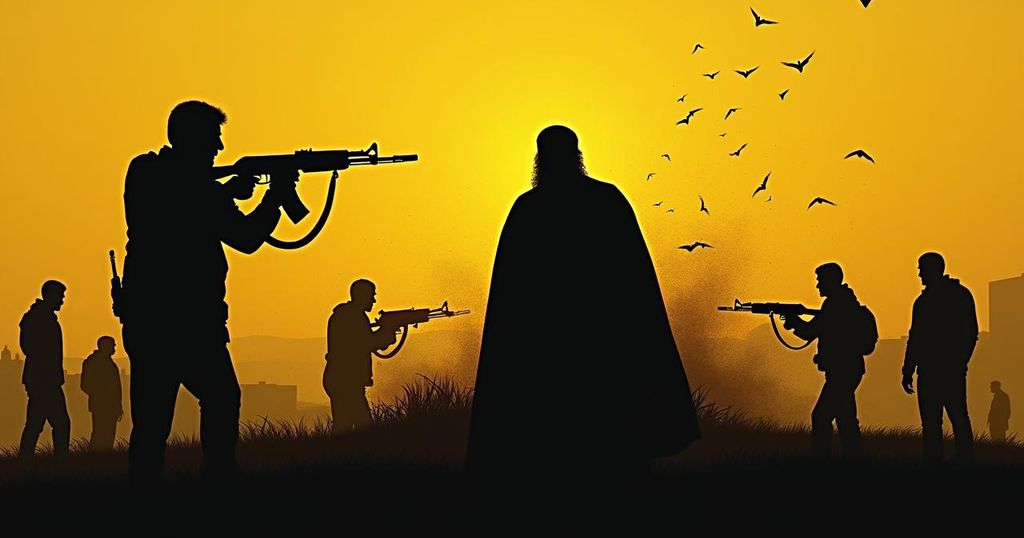Hezbollah Confirms Death of Leader Hassan Nasrallah in Israeli Airstrike
Hezbollah leader Hassan Nasrallah was killed by an Israeli airstrike in Beirut, confirmed on Saturday. The airstrike resulted in multiple casualties, including other Hezbollah commanders. The incident signifies a severe rise in tensions between Israel and Hezbollah, with both sides intensifying military actions. Nasrallah’s death may incite a change in Hezbollah’s operational strategies, while the humanitarian crisis in Lebanon continues to worsen amid escalating hostilities.
On Saturday, Lebanon’s Hezbollah group confirmed the death of its leader, Hassan Nasrallah, due to an Israeli airstrike in Beirut on the previous day. Hezbollah declared that Nasrallah “has joined his fellow martyrs” and vowed to continue its fight against Israel in the context of supporting Palestine. With over thirty years of leadership, Nasrallah’s death represents a significant loss for Hezbollah amidst a backdrop of intensified conflict with Israel. The Israeli military stated that the airstrike was executed with precision while Hezbollah leaders were convened in Dahiyeh, an area south of Beirut. The Lebanese Health Ministry reported that the airstrike resulted in six fatalities and 91 injuries, alongside the destruction of six residential buildings. Notably, Ali Karki, a prominent commander of the Hezbollah Southern Front, was among those killed. In addition to Nasrallah, Iran confirmed the death of General Abbas Nilforushan, a deputy commander in the Iranian Revolutionary Guard, who was sanctioned by the United States. The killing of Nasrallah marks a notable escalation in hostilities in the Middle East, particularly between Israel and Hezbollah. In Israel, air raid sirens were activated, coinciding with Prime Minister Benjamin Netanyahu’s return from a trip to the U.S. The military indicated that missile threats were addressed, although specifics regarding casualties from the airstrikes were not disclosed. Israel’s Chief of Staff stated that the elimination of Nasrallah is merely one aspect of Israel’s broader strategy against Hezbollah, hinting at ongoing operations. Defense Minister Yoav Gallant emphasized that this action is among the most significant targeted strikes since Israel’s establishment, underscoring Israel’s resolve to intensify its operations against Hezbollah as retaliatory assaults continue across the border, displacing thousands of civilians in both Israel and Lebanon. Since the onset of violence following attacks by Hamas on Israel, Hezbollah has been actively engaging in hostilities, a dynamic that has displaced over 200,000 individuals in the last week alone. The Israeli military has successfully targeted significant components of Hezbollah’s military capacity, albeit acknowledging that much of its arsenal remains intact. Moreover, the humanitarian situation in Lebanon becomes dire as civilians flee, with a reported 1,030 casualties due to Israeli strikes within a two-week timeframe. Analysts speculate that Nasrallah’s departure may incite less senior Hezbollah commanders to adopt more aggressive strategies, complicating the already tense conflict dynamics. Some experts suggest this moment could offer Lebanon an opportunity to diminish Hezbollah’s influence, particularly as the group appears weakened after the loss of its leader. Following the confirmation of Nasrallah’s death, scenes of mourning unfolded in Beirut as individuals took to the streets, expressing their grief and disbelief amidst a turbulent atmosphere.
The topic of this article discusses the recent confirmation of Hassan Nasrallah’s death, the leader of Hezbollah, following an Israeli airstrike in Beirut. Nasrallah’s death has significant implications in the ongoing conflict between Israel and Hezbollah, which has escalated amidst heightened military actions, including cross-border strikes. This incident underscores the severe humanitarian impacts of the ongoing hostilities, with large-scale displacement on both sides. Additionally, the reactions from various stakeholders, including the Lebanese government, Iranian officials, and other militant groups like Hamas, reflect the broader ramifications of this event on regional stability and security.
In summary, the assassination of Hassan Nasrallah by an Israeli airstrike marks a pivotal event in the ongoing conflict between Israel and Hezbollah, with potential to reshape the dynamics of military engagements in the region. Hezbollah’s commitment to retaliate and the ongoing military responses illustrate the foreseeable continuation of heightened tensions and violence. The humanitarian crisis exacerbated by these hostilities is of significant concern, compounded by the displacement of thousands of civilians. Analysts are divided on the long-term implications of Nasrallah’s death, particularly concerning Hezbollah’s future actions and Iran’s potential responses.
Original Source: www.pbs.org




Post Comment